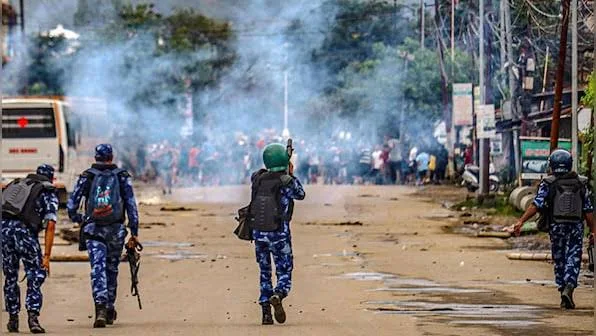Resolving Manipur conflict requires multi-pronged approach to address historical grievances, ethnic divisions, governance failures
Manipur, a princely state dating back to 33 AD, is a multi-ethnic society comprising Meiteis, Kukis, and Nagas. The Meiteis, predominantly Hindu, have historically dominated the Imphal Valley, while the hill-based Kukis and Nagas, mostly Christian, have maintained relative autonomy. British colonial rule from 1826 to 1947 formalized ethnic divisions by categorizing communities and restricting Meiteis from settling in the hills, sowing the seeds of territorial disputes.
In April 2023, the Manipur High Court recommended granting Scheduled Tribe (ST) status to the politically and economically dominant Meiteis, sparking protests from the Kuki-Zo and Naga tribes, who feared dilution of their ST benefits, including job quotas and land protection. Since May 2023, ethnic violence between the Meiteis and Kuki-Zo has led to serious violations of fundamental rights. Reports indicate that more than 250 people have been killed, over 60,000 displaced, and homes, businesses, and religious sites extensively destroyed. Despite increased security presence and the imposition of President’s Rule, the conflict remains unresolved.
Resolving ethnic tensions in Manipur requires a multi-pronged approach that addresses historical grievances, governance failures, and ongoing violence. Establishing a neutral, high-level peace commission with representatives from the Meitei, Kuki-Zo, and Naga communities, assisted by impartial mediators such as independent civil society leaders or retired judges, can facilitate transparent inter-community dialogues on land rights, political representation, and resource allocation. Ensuring that all groups, including women and youth, have a voice in these discussions is crucial.
Political and economic disparities must be addressed through reforms that balance power between the valley and hill regions. Strengthening Hill District Councils and Autonomous District Councils with greater financial and administrative powers can help bridge economic gaps. Equitable development plans for hill districts, including investments in infrastructure, healthcare, and education, are essential to reducing tribal marginalization.
A comprehensive disarmament campaign is necessary to recover an estimated 4,500 looted weapons from the 2023 violence and eliminate insurgent groups such as the Arambai Tenggol and Kuki militias. Providing amnesty for surrendered weapons can help reduce radicalization, while retraining security forces to act impartially and enforcing strict accountability for human rights violations can break the cycle of impunity.
Humanitarian efforts must focus on assisting the 60,000 displaced persons through safe return or resettlement with adequate shelter, food, and healthcare. Establishing rehabilitation centers with trauma counseling can address psychological impacts, while rebuilding destroyed infrastructure—including houses, schools, churches, and temples—using community input can help restore trust and normalcy.
Governance must be strengthened with decisive central oversight to restore order while maintaining neutrality under President’s Rule, implemented in February 2025. Appointing an inclusive advisory committee with local stakeholders can guide governance, while restoring communication channels and avoiding blanket internet shutdowns can prevent misinformation and promote community engagement.
Public campaigns to counter divisive narratives, such as labeling Kukis as “illegal immigrants” or Meiteis as “outsiders,” are essential for rebuilding trust. Media and community leaders should promote unity and a shared Manipuri identity, while civil society and religious leaders can mediate grassroots reconciliation through interethnic cultural events.
Long-term structural reforms should focus on developing a federal framework that grants greater autonomy to the hill regions while maintaining unity within the state. Lessons from successful models such as the Mizoram peace accord can inform policy decisions. Education and awareness programs that reduce racial stereotypes and promote mutual understanding among communities will be key to ensuring lasting peace.
---
*A citizen dedicated to protecting peace in India


Comments